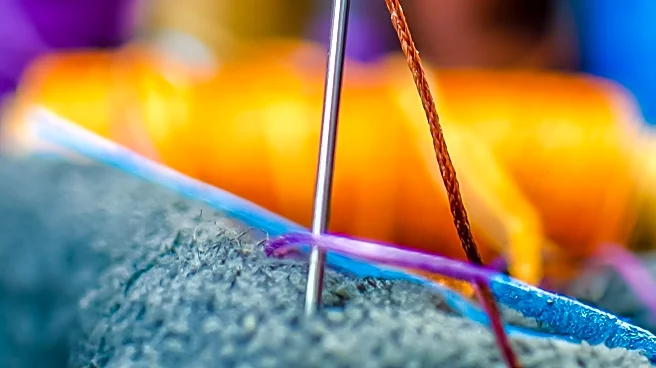What's Happening?
A novel acupuncture technique known as 'gold thread acupuncture' has come under scrutiny due to potential health risks. This method, prevalent in northeastern Asia, involves embedding fine gold threads permanently into the body to provide ongoing stimulation. Unlike traditional acupuncture, where needles are removed after treatment, these threads remain in the tissue. Recent reports have highlighted cases in South Korea where patients experienced adverse effects. A 65-year-old woman with osteoarthritis of the knee underwent this treatment, which led to thickened tissue and abnormal growths around her knee joint. X-rays revealed hundreds of gold threads embedded in her tissue. Another case involved a 58-year-old woman with rheumatoid arthritis who experienced worsening symptoms after opting for this treatment over conventional medication. These cases have raised concerns about the safety and efficacy of gold thread acupuncture, particularly regarding the risk of infections and tissue damage.
Why It's Important?
The emergence of gold thread acupuncture as a treatment option highlights the ongoing search for alternative pain relief methods, especially for chronic conditions like osteoarthritis and rheumatoid arthritis. However, the potential risks associated with this technique underscore the importance of rigorous evaluation and regulation of alternative therapies. The cases reported in South Korea suggest that while patients seek relief from conventional medicine's side effects, they may inadvertently expose themselves to new health risks. This situation emphasizes the need for healthcare professionals to provide comprehensive guidance on the benefits and risks of alternative treatments. Additionally, it raises questions about the regulation of such practices and the need for standardized safety protocols to protect patients.
What's Next?
As awareness of the potential risks associated with gold thread acupuncture grows, it is likely that medical authorities and regulatory bodies will investigate the practice further. This could lead to increased scrutiny and possibly new guidelines or restrictions on its use. Healthcare providers may also need to educate patients more thoroughly about the potential risks and benefits of alternative therapies. Patients currently using or considering this treatment may seek advice from medical professionals to weigh their options carefully. The broader medical community may also conduct further research to better understand the long-term effects and safety of embedding foreign materials in the body for therapeutic purposes.
Beyond the Headlines
The controversy surrounding gold thread acupuncture also touches on broader issues related to the integration of traditional and alternative medicine in modern healthcare. It raises ethical questions about patient consent and the responsibility of practitioners to ensure that patients are fully informed about the potential risks of unconventional treatments. Furthermore, it highlights cultural differences in medical practices and the challenges of regulating treatments that may be deeply rooted in cultural traditions. This situation could prompt a reevaluation of how alternative therapies are perceived and integrated into mainstream healthcare systems.









